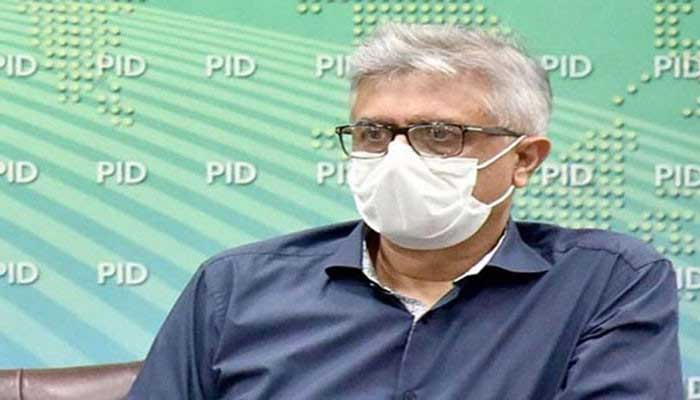‘Pakistan needs trained workforce for local research in health sector’
KARACHI: Special Assistant to Prime Minister (SAPM) on Health Dr Faisal Sultan on Wednesday reiterated that local research and innovation in the area of healthcare is the need of the hour to ‘guide our actions’ and this can only be done by producing an educated, trained and qualified workforce for health services in the country.
“There is a need for highly trained and qualified people to conduct local research and find out if the global solutions would work locally or not. Of course, they would be following global research but it has to be adopted as per our needs and requirements,” Dr Faisal Sultan said while speaking at the launch of courses of entomology, nutrition, ORIC at the Health Services Academy of Islamabad.
Accompanied by Parliamentary Secretary Health Dr Nausheen Hamid, Federal Secretary Health Aamir Ashraf Khawaja, as well as other officials of the National Health Services, Regulations and Coordination, Dr Faisal Sultan inaugurated the ORIC and other facilities for the researchers at the HSA Islamabad and lauded the efforts of its Vice Chancellor Dr Shahzad Ali Khan for the training of healthcare professionals.
“I’m glad that the Health Services Academy (HSA), whose niche role was to produce such an educated and trained workforce, is doing its job effectively under the leadership of Dr Shahzad Ali Khan, who is an enthusiastic and dynamic personality. Contrary to the common impression about public sector organisations, HSA is doing its job effectively,” Dr Faisal Sultan added.
He said the certificate courses on entomology as well as on nutrition that would lead to master’s degree programme would provide trained and educated workforce to deal with dengue, malaria and other vector-borne diseases. Nutrition is another area where we need experts as not only our under privileged but people from our affluent class also facing malnutrition due to lack of knowledge, he added.
Claiming that reformed Pakistan Medical Commission is free of influence and any conflict of interest, he said it is striving for the betterment of medical education, which is evident from the results of the National Licensing Exam in which medical graduates from most of the medical colleges performed extraordinarily. “There are, however, some medical colleges, whose half of the students failed in the NLE, which means that they need to give effective education and knowledge of applied sciences,” he said.
-
 James Van Der Beek's Quiet Sacrifice Before Death Comes To Light
James Van Der Beek's Quiet Sacrifice Before Death Comes To Light -
 Suspect Kills Six Across Florida Before Taking His Own Life
Suspect Kills Six Across Florida Before Taking His Own Life -
 AI Helps Researchers Identify 2,000-year-old Roman Board Game Stone
AI Helps Researchers Identify 2,000-year-old Roman Board Game Stone -
 Inside Kate Middleton, Prince William’s Nightmare Facing Andrew Mountbatten-Windsor
Inside Kate Middleton, Prince William’s Nightmare Facing Andrew Mountbatten-Windsor -
 Margaret Qualley Shares Heartfelt Confession About Husband Jack Antonoff: 'My Person'
Margaret Qualley Shares Heartfelt Confession About Husband Jack Antonoff: 'My Person' -
 Savannah Guthrie Shares Sweet Childhood Video With Missing Mom Nancy: Watch
Savannah Guthrie Shares Sweet Childhood Video With Missing Mom Nancy: Watch -
 Over $1.5 Million Raised To Support Van Der Beek's Family
Over $1.5 Million Raised To Support Van Der Beek's Family -
 Paul Anthony Kelly Opens Up On 'nervousness' Of Playing JFK Jr.
Paul Anthony Kelly Opens Up On 'nervousness' Of Playing JFK Jr. -
 Diana Once Used Salad Dressing As A Weapon Against Charles: Inside Their Fight From A Staffers Eyes
Diana Once Used Salad Dressing As A Weapon Against Charles: Inside Their Fight From A Staffers Eyes -
 Video Of Brad Pitt, Tom Cruise 'fighting' Over Epstein Shocks Hollywood Fans
Video Of Brad Pitt, Tom Cruise 'fighting' Over Epstein Shocks Hollywood Fans -
 Jelly Roll's Wife Bunnie Xo Talks About His Huge Weight Loss
Jelly Roll's Wife Bunnie Xo Talks About His Huge Weight Loss -
 Margot Robbie Reveals Why She Clicked So Fast With Jacob Elordi
Margot Robbie Reveals Why She Clicked So Fast With Jacob Elordi -
 Piers Morgan Praised By Ukrainian President Over 'principled Stance' On Winter Olympics Controversy
Piers Morgan Praised By Ukrainian President Over 'principled Stance' On Winter Olympics Controversy -
 Halsey's Fiance Avan Jogia Shares Rare Update On Wedding Planning
Halsey's Fiance Avan Jogia Shares Rare Update On Wedding Planning -
 Instagram Head Adam Mosseri Says Users Cannot Be Clinically Addicted To App
Instagram Head Adam Mosseri Says Users Cannot Be Clinically Addicted To App -
 James Van Der Beek Was Working On THIS Secret Project Before Death
James Van Der Beek Was Working On THIS Secret Project Before Death




